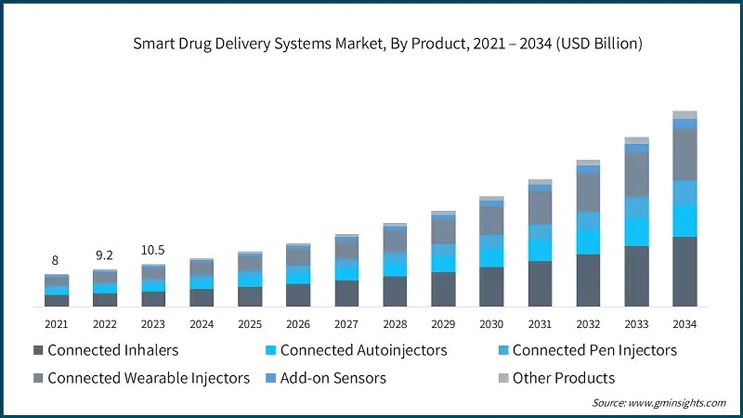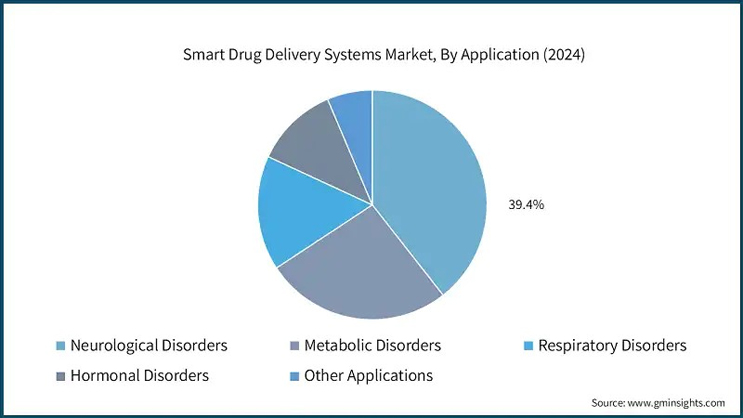Smart Drug Delivery Systems: Emerging Market Trends
By Pooja Sharma, Global Market Insights

The global healthcare ecosystem is undergoing a rapid transformation, driven by technological advancements and a growing demand for personalized treatments. Among these innovations, smart drug delivery systems (SDDS) have emerged as a pivotal breakthrough, offering tailored drug administration, improved patient compliance, and real-time monitoring capabilities. These intelligent systems are redefining how therapies are administered, particularly for chronic and complex conditions such as neurological disorders.
The urgency for such solutions is underscored by a 2023 report from the World Health Organization (WHO), which reveals that noncommunicable diseases (NCDs) are currently responsible for nearly three-quarters of all global deaths annually. If current trends persist, chronic illnesses — including cardiovascular diseases, cancer, diabetes, and respiratory disorders — are projected to account for 86% of the estimated 90 million deaths per year by 2050, reflecting a staggering 90% increase in absolute numbers compared to 2019.
According to the latest report by Global Market Insights, the global smart drug delivery systems market reached $12 billion in 2024 and is expected to grow at a CAGR of 17% from 2025 to 2034. This growth is largely attributed to the rising prevalence of chronic diseases, advancements in wearable drug delivery technologies, and the increasing demand for more targeted and effective therapeutic approaches.
Product Spotlight: Connected Inhalers Transforming Respiratory and Neurological Care

Among various product categories, connected inhalers are gaining significant traction for their role in improving disease management, particularly in respiratory and neurological conditions. These smart devices are integrated with sensors and Bluetooth capabilities that track medication usage, monitor adherence, and share data with healthcare providers in real time.
Recent developments continue to highlight their growing relevance. In February 2021, research from Ann & Robert H. Lurie Children’s Hospital of Chicago revealed that “smart” asthma inhaler sensors not only improve asthma control in children but also enhance the quality of life for caregivers. The study emphasized the potential of such technology in engaging diverse pediatric populations. More recently, in October 2024, Modivcare, through its subsidiaries Valued Relationships and Higi Care, partnered with Tenovi to deploy Adherium’s Hailie smart inhalers. This collaboration aims to improve care for patients with chronic respiratory diseases, leveraging Tenovi’s Cellular Gateway to streamline data transmission from multiple connected devices, eliminating the need for individual cellular connections or personal mobile devices.
While asthma and COPD are the primary therapeutic areas, the potential of connected inhalers in neurological disorders — especially for delivering drugs targeting the central nervous system (CNS) — is under active exploration. Intranasal delivery via connected inhalers can bypass the blood-brain barrier, offering a non-invasive and efficient alternative for administering treatments for conditions such as Alzheimer’s, Parkinson’s, and multiple sclerosis.
Neurological Disorders: A Key Application Area with Growing Demand

Smart drug delivery systems are increasingly being adapted for neurological disorders, given the complexity and chronic nature of these conditions. According to the latest WHO report, neurological disorders now affect more than one in three people globally, making them the leading cause of illness and disability.
One of the major challenges in neurological drug development is crossing the blood-brain barrier. Smart drug systems, including injectables with nanocarriers and wearable delivery devices, are now enabling targeted delivery to the CNS, ensuring higher efficacy and reduced systemic side effects. In a breakthrough announced in February 2025, a research team from the Department of Robotics and Mechatronics Engineering at the Daegu Gyeongbuk Institute of Science and Technology (DGIST) developed a foldable smart patch that integrates real-time biometric monitoring with drug delivery capabilities. Designed for cardiovascular health, this technology is expected to find broad applications in chronic disease treatment, including neurological care.
In Alzheimer's research, smart systems are being developed to deliver beta-amyloid-clearing antibodies at controlled intervals, potentially delaying disease progression. These solutions not only improve therapeutic accuracy but also empower caregivers and healthcare providers with real-time data insights, paving the way for more proactive and personalized neurological care.
Route Of Administration: Injectable Segment Holds Strong Market Share
In terms of route of administration, injectables continue to dominate the smart drug delivery space due to their rapid absorption, precision, and wide applicability across therapeutic areas. The segment garnered a valuation of $7.6 billion in 2024, with strong projections through the forecast period.
Smart injectables often come in the form of electronic auto-injectors, wearable injectors, or microneedle patches — designed to reduce pain, automate dosing schedules, and improve patient compliance. A notable example is Stevanato Group’s Vertiva 10-mL On-Body Delivery System, introduced in October 2024 at CPHI Milan. This prefilled, preloaded wearable platform supports highly viscous biologics and can be programmed for various motor-driven dosing profiles, from micro-precision basal delivery to full-content bolus injections. Its adaptability makes it well suited for administering a wide range of therapies for cardiovascular, metabolic, oncological, immunological, and pain-related conditions.
The versatility of injectable smart delivery platforms makes them a cornerstone in chronic disease management, especially when integrated with digital therapeutics and health monitoring tools.
Hospitals Remain Primary End Users
Hospitals represent the leading end user segment for smart drug delivery systems, with a valuation of $5.5 billion in 2024, attributed to the high volume of patients requiring specialized and critical care. These settings demand accurate dosing, data-driven treatment protocols, and seamless integration with electronic health records (EHRs). Reflecting this shift, a recent Health Affairs study based on the 2023 American Hospital Association Annual Survey found that around 65% of U.S. hospitals — totaling 1,696 facilities — have adopted artificial intelligence or predictive models integrated with their EHR systems.
Hospitals are increasingly investing in AI-integrated infusion systems, smart IV pumps, and remote monitoring wearables that synchronize with hospital management software. The aim is to enhance patient safety, minimize human error, and reduce hospital-acquired complications. This trend underscores how hospitals are not just consumers but also incubators for innovation, partnering with medtech startups and pharma companies to trial and deploy next-gen delivery systems.
Eminent Companies Operating In The Smart Drug Delivery Systems Industry
- Amiko Digital Health
- Becton, Dickinson and Company
- Biocorp
- Elcam Medical
- Johnson & Johnson
- Medtronic
- Merck
- Nemera
- Novo Nordisk
- Pfizer
- Phillips-Medisize
- Portal Instruments
- Teva Pharmaceutical Industries
- West Pharmaceutical Services
- Ypsomed
North America Leads The Smart Drug Delivery Revolution
North America, especially the United States, remains the largest and most advanced regional market for smart drug delivery systems. In 2024, the region accounted for $5.5 billion in revenue and is expected to reach $22.2 billion by 2034.
The region’s growth is fueled by factors such as:
- high prevalence of chronic diseases
- strong healthcare infrastructure
- favorable reimbursement policies
- active collaboration between tech startups and pharmaceutical giants.
Companies like Medtronic, Johnson & Johnson, and Insulet Corporation are headquartered in the U.S., driving local innovation and export potential. For instance, in November 2024, Medtronic received FDA clearance for its updated InPen smartphone app and launched its Smart MDI system designed to provide real-time insights into multiple daily injection (MDI) therapy. This move highlights the growing emphasis on connected patient-centric solutions.
In addition, the presence of FDA-approved digital health frameworks and fast-track approval pathways is encouraging more players to enter the market with novel smart delivery platforms. Government initiatives like the Digital Health Innovation Action Plan and investment in AI-based drug development are further solidifying North America’s leadership.
United States: Pioneering Clinical Integration And Consumer Adoption
Zooming in on the United States, the country is not only the largest consumer but also the prime innovator in this space. The U.S. market amassed a valuation of $5 billion in 2024, supported by an aging population, rising chronic disease burden, and increasing acceptance of remote and personalized care. According to the CDC, chronic diseases are the leading cause of death and disability in the United States, with six out of 10 Americans living with at least one chronic condition and four out of 10 managing two or more.
In the U.S., smart delivery systems are being integrated into:
- telehealth platforms for remote patient management
- home-based care models to reduce hospitalization
- clinical trials to monitor pharmacokinetics in real time.
Case in point: In March 2022, drug manufacturer Fresenius Kabi took a strategic step to strengthen its intravenous drug portfolio by acquiring smart infusion pump maker Ivenix for $240 million. This move aimed to secure a newly FDA-approved device platform for the U.S. market, following its recent commercial launch, while also enhancing Fresenius Kabi’s global infusion therapy solutions.
Such advancements are creating a comprehensive ecosystem where drug delivery, patient behavior, and healthcare provider insights converge for optimal therapeutic outcomes.
Final Thoughts: Smart Systems Fueling The Future Of Healthcare
The smart drug delivery systems market is rapidly evolving from a niche innovation to a mainstream healthcare solution. From connected inhalers revolutionizing neurological care to injectables supporting precise biologic administration, the scope of SDDS is vast and impactful.
As hospitals embrace intelligent technologies, North America leads the way in adoption, and the U.S. spearheads digital health integration, the market is well positioned for sustainable growth. With ongoing R&D and strategic partnerships, smart drug delivery systems are set to define the future of patient-centric, technology-enabled healthcare.
To purchase/access the full market research report, it can be found here.
About The Author:
 Pooja Sharma is a writer at Global Market Insights who writes about technology, healthcare, and chemical sectors.
Pooja Sharma is a writer at Global Market Insights who writes about technology, healthcare, and chemical sectors.
